Richard Branson, founder of the Virgin empire, is much more than an entrepreneur: he is a visionary who has pushed the boundaries of business, adventure, and philanthropy. From his beginnings with a student magazine to his journey into space, Branson champions a human-centered leadership committed to people and the planet. In this interview, he reflects on artificial intelligence, climate change, and his calling to change the world with passion, empathy, and action.
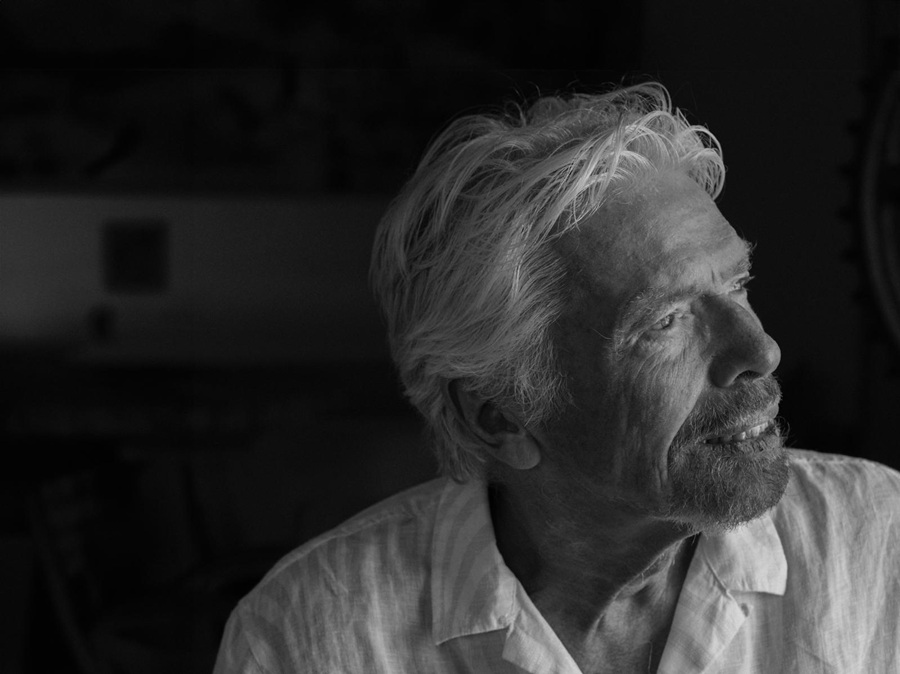
Richard Branson. Foto: Paloma Rodriguez Barceló
There are lives so rich and prolific that capturing them in a few sketches is almost an impossible challenge. This is the case of Sir Richard Branson (London, 1950), founder of the Virgin Group, a conglomerate of more than 360 multinational companies. The Virgin brand is closely tied to the image of its founder, who stands out for his courage—with flashes of recklessness—sharp instinct, iron will, fertile enthusiasm, empathetic attitude, and a great sense of fun. His dyslexia led him to enhance his imagination and become more intuitive.
This personality helped carve the path toward the creation of an empire that began when he was just 15 years old with the founding of Student, a socially conscious magazine. At the same time, he created the Student Advisory Centre, a charitable initiative that continues to this day under Virgin Unite. In the early 1970s, he envisioned a discount music distribution business and launched Virgin Mail Order, Virgin Records, and later made a splash in the music industry with the successful Virgin Music.
As detailed in his gripping autobiography Losing My Virginity (Alienta Ediciones), his constant drive for the impossible, his taste for adrenaline, and his attraction to vertigo led him to turn business into a lifestyle—where fun is one of the key criteria. This philosophy led to the creation of Virgin Mobile, Virgin Atlantic Airways—a prestigious airline—and hundreds of other companies under the Virgin brand. But his most ambitious goal has been the interspace company Virgin Galactic Airways, which took him into space—beating Jeff Bezos and Elon Musk in the race.
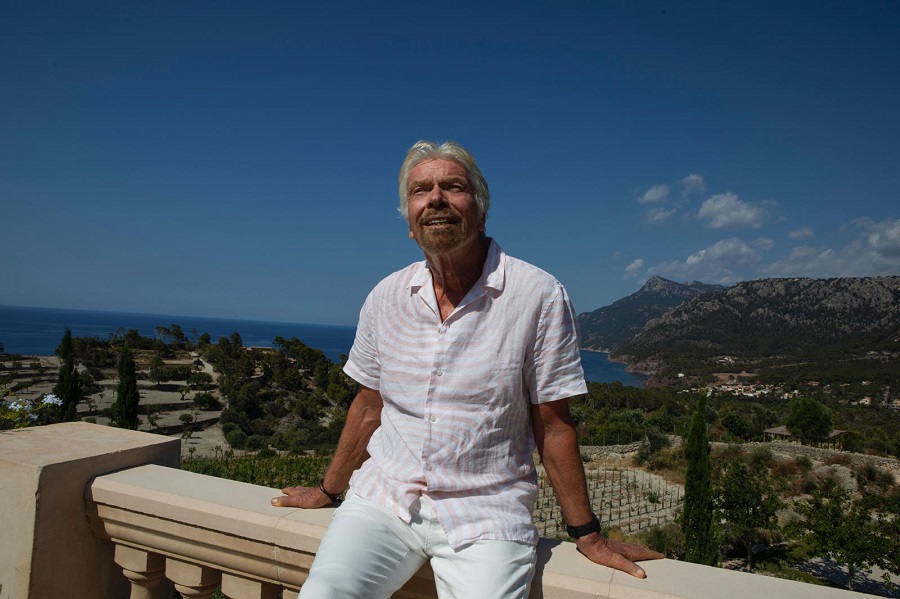
Richard Branson, on the terrace of the Son Bunyola hotel. Photo: Paloma Rodriguez Barceló
This fearless spirit in business also extends to physical challenges and extreme adventures, where he has pushed his limits. He has risked his life in dangerous feats such as crossing the Atlantic in a speedboat in record time, reclaiming the Blue Riband for Great Britain. He was the first to cross, at great risk, both the Atlantic and the Pacific oceans in the world’s largest hot air balloons.
We are in Mallorca, specifically in Son Bunyola, a 16th-century manor house nestled in the natural setting of the Serra de Tramuntana. Branson has transformed it into one of the most unique hotels in the Balearic Islands, thanks to its breathtaking panoramic views of the sea, vineyards, and mountainous landscape—so characteristic of the beauty of this region, declared a World Heritage Site. Mallorca is special to Branson, as it was here that he was conceived during his parents’ honeymoon in 1949. His grandson even carries the name of the beautiful Mallorcan village of Deià.
He welcomes me with a warm smile, barefoot, true to his hippie soul. He invites me to a game of chess—which he wins easily—and we begin the interview.
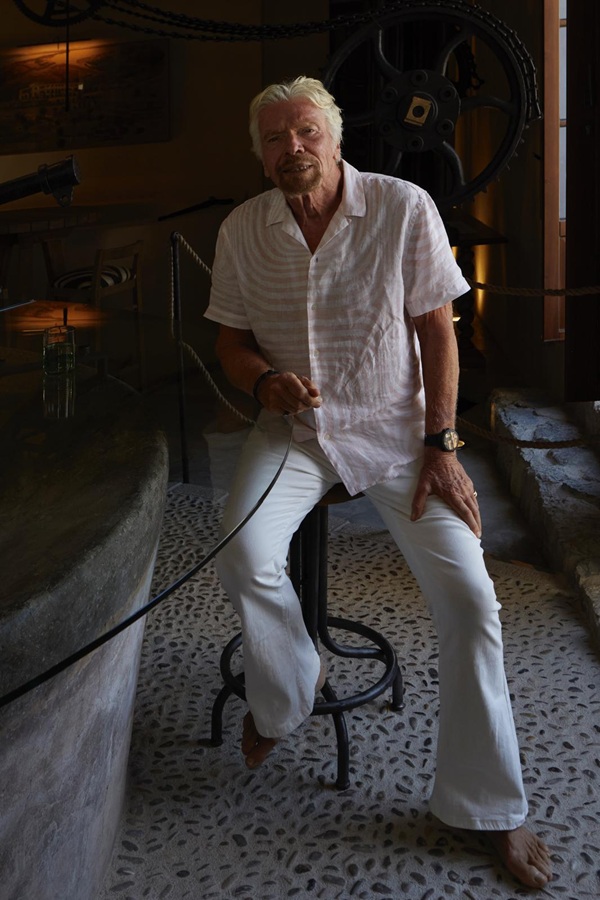
Richard Branson. Tafona in Son Bunyola. Photo: Paloma Rodriguez Barceló
You have always been at the forefront. In 1999, you founded Virgin Mobile, redefining the communications market by introducing the low cost model. What do you find most interesting in today’s business world?
Many years ago when I started in business there weren't any entrepreneurs as such. Everything was run by governments. had British Airways, British Gas, British Steel, British Coal... And therefore things were expensive and the quality of things were not good. When we started there was myself, there was a woman called Anita Roddick from Body Shop.
What qualities should an entrepreneur possess?
An entrepreneur is basically somebody that comes up with an idea to make other people's lives better someone with an idea to improve people’s lives. So because there are so many entrepreneurs, the world by and large has become a much better place because of entrepreneurs. And right now, with some very questionable people in certain government positions, the world needs entrepreneurs even more because when you have a government like in U.S that doesn't believe in climate change, it's up to entrepreneurs to spend the time and effort to make sure that the world is powered by clean energy. When you have a government that is not supporting women's rights, as has happened in one or two big countries, then entrepreneurs need to be getting out there to help people. And when you have a government that's cutting down rainforests, you've got to have entrepreneurs that are replanting rainforests and so on. So I think that the responsibility for entrepreneurs is even greater today than it used to be.
That’s the mission of Virgin Unite, one of the group’s companies focused on making the world a better place. What exactly does that support consist of?
Through our foundation, we’ve been working on twenty different organizations. One that's dealing with the planetary issues of the world, another one that's dealing with conflict resolution issues, another one that's trying to repeal the war on drugs and get drugs treated as a health problem, and so on. We’re not going to change the world, but we can at least do our part.
In 2003, along with Nelson Mandela and with support from Kofi Annan, you proposed a plan to prevent the U.S. from bombing Iraq. Unfortunately, it came too late. From that experience, the idea emerged to create a group of respected global elders like Mandela—wise, independent negotiators to speak on behalf of humanity and defend peace and universal rights. What happened with The Elders?
We started The Elders because of the Iraq war, trying to deal with Saddam Hussein. They’ve had some successes, and many failures. They’ve been to Israel and Palestine, also to Syria. They managed to stop a major conflict in Kenya…
Between the Luos and the Kikuyus?
Exactly. Kofi Annan was one of the Elders. Archbishop Desmond Tutu, Nelson Mandela, and Graça Machel, was Nelson Mandela's wife. They went to Kenya and brought everyone together. They also founded another wonderful organization called Girls Not Brides to help prevent girls getting married very young and that they've had a lot of success. Naturally, as Elders, some have passed away. Mandela's died, Kofi has died, Archbishop Tutu's recently died. But there are still wonderful people there and new people coming on board, like Mary Robinson and some quite exciting new names coming on board. so we're just going to spend three days just looking back at the last 20 years, seeing what's worked, what hasn't worked, how we can make sure that the next 20 years the elders are even more relevant.
What a wonderful idea and what outstanding members!
My son Sam has just made a film "The Rebel with a Cause", which is about Archbishop Tutu. You should see that. It's just coming out in about two months time.
One thing I missed in your two autobiographies is your perspective on Artificial Intelligence. What’s your opinion on AI?
First of all, it must be regulated. It’s so powerful that it can be dangerous. The U.S. governmentis is not a government that would regulate, the timing of its launch is slightly unfortunate. is not exactly known for regulating things. It will wipe out a huge number of valuable jobs. I mean there's no need for programmers anymore and there's a lot of good jobs that are going to disappear. It will have a very negative effect on the environment.
AI has only been going ready three years, four years, and it's already using more energy than all the airlines plus the whole of Japan. By 2030 plus the whole of India, by 2050 it would have doubled the amount of energy consumption in the world. So, little things like, don't be polite to AI, don't say thank you, don't say please. All these things can save a tiny bit of energy. There’s also the risk that someday it could trigger a nuclear war. But on the other hand, as someone with dyslexia, I can ask AI for help with almost anything. I’ve spent most of my life telling parents that dyslexia is a gift.
AI is going to generate trillions of dollars that will likely end up in the hands of maybe 20 people. Hundreds of thousands will lose their jobs. So we’ll need a basic universal income. That will create interesting political debates. And those 20 people who control AI will be extremely powerful. I don’t want to sound negative. Clearly, AI is extraordinary. It might even solve climate change.
Climate change is a controversial topic, but there is a broad consensus on the need to take care of our planet: reducing CO₂ emissions, finding technological solutions for carbon mitigation, cutting deforestation for agriculture, and promoting reforestation. As scientist David Attenborough states in his latest documentary Ocean, saving the oceans means saving the Earth. As the owner of an airline, you’ve shown strong commitment to this cause. What have you learned over the years?
Some people say it doesn’t exist, that it’s a natural phenomenon. But we know there are problems with CO₂ emissions, deforestation for agriculture… it’s absolutely crazy—like what’s happening in the Amazon.
What is your relationship with Al Gore in this context?
Al Gore was one of the first to clearly identify the problem. I was lucky enough to have him at my house before An Inconvenient Truth was released. He talked to me and convinced me to get involved. The idea that people still doubt climate change is inconceivable to me, 99% of scientists are completely sure that humans are creating a sort of blanket around the Earth that thickens every year. The more carbon we emit, the thicker it gets and the more heat it traps—for many years. It’s the same with oil and gas carbon. If you have a blanket on your bed, the thicker the blanket, the hotter you're going to be. So what Trump says is basically nonsense. Very sad. The world was galvanizing in absolutely the right direction until about four months ago, five months ago when Trump took over in America. There was a wonderful organization within the American government that was really pushing America into being 30 % carbon neutral by 2030. That organization has been disbanded.
And what about other countries?
Europe is doing a good job. China is doing a very good job. Partly because they're worried about climate change, but also because they import most of their dirty fuels. And they're growing so fast, they need as much clean energy as possible. Clean energy now is cheaper than coal. So it makes sense, both energetically and economically to power everything on clean energy. And to me, it's delightful if you can be in a swimming pool, heated swimming pool, or an ice bath, with feeling not guilty at all because it's by the sun or the wind. So we will continue to speak out and try to galvanize countries and do what we can with our businesses to try to get everything as clean as possible. But there's still a lot of work to be done, particularly when the biggest country in the world, the biggest emitter in the world has gone off the radar for the next four years.
One of your mottos is, “Surround yourself with a great team and motivate them. Think big.” The wisdom and success of a company lie in its ability to choose the right people. What criteria have you used when selecting your team?
In any company, success depends on the people running it. I think the most important thing is that the person leading is genuinely kind, cares about people, and wants to bring out the best in them. Someone who praises, not criticizes, and is willing to forgive when people make mistakes. Instead of looking for an outsider, promote from within. You might not get the world’s best candidate, but it means people know they have a chance to rise. And you already know their strengths and weaknesses before promoting them.
Some companies call themselves “a family,” but they’re not at all. Still, that should be the ideal: treat people as you would your siblings or children—with no difference. That’s the goal. It’s smart and simple, but not everyone does it. I suppose some don’t because they’re insecure.
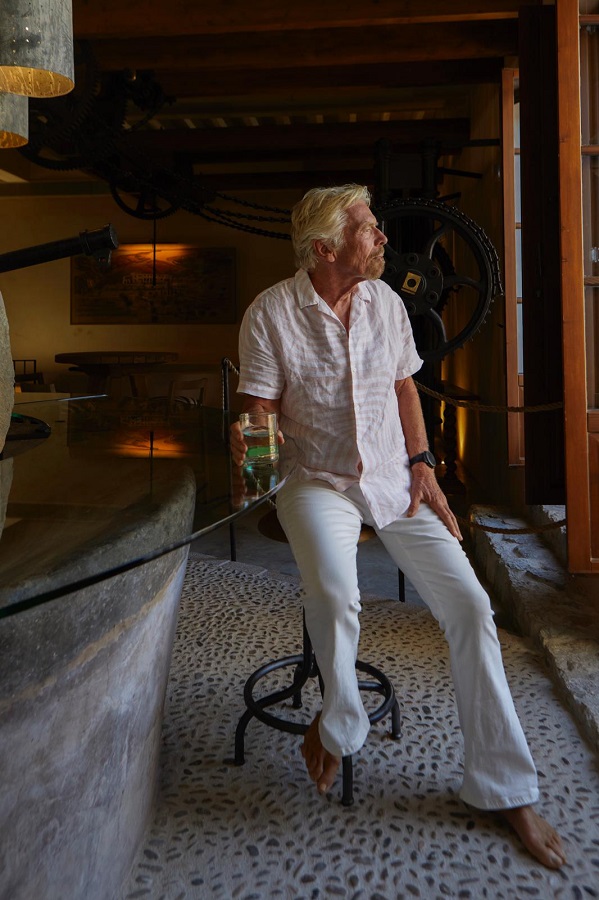
Richard Branson. Tafona in Son Bunyola. Photo: Paloma Rodriguez Barceló
After having taken on such life-threatening challenges, how have you dealt with fear in those extreme situations?
I’m not someone who doesn’t feel fear. I feel fear like anyone else. And although it might not seem like it, I’m not reckless. I love life. But that said, I can’t say no.
You’re an adventurer.
Yes. If someone proposes an amazing adventure… In my first magazine I wrote the phrase: “The brave may not live forever, but the cautious do not live at all.” I guess that’s been my life philosophy. As an entrepreneur, I’ve had to focus my mind, fight to survive. And as an adventurer too. In moments of crisis, you just have to give it your all. Fight. In business, if I have a critical night, I’ll fight all night. And if I lose the business, the next day I’ll get up and start something else. If a hurricane destroys my home, I move on the next day. As an adventurer, the risk is your life, so it’s not so simple. But fortunately, I have a lucky star up there watching over me—a kind spirit. And that makes me work even harder to protect our beautiful world. I promise I’ll give thanks properly.
What does it feel like to be close to death?
You feel sad for your family. But interestingly, it didn’t stop me from continuing. And now my kids and I have climbed Mont Blanc twice together, the Matterhorn, Mount Toubkal. We’ve done 2,000-kilometer bike rides through Italy. This year we’re going to India together. And yes, there’s always the risk that one of us might not come home. But our lives are so much more interesting.
You became involved in the Iraq War in 1990 when Queen Noor of Jordan asked for help for refugees. You sent over 40,000 blankets, medicine, and rice on your plane and brought back British citizens trapped in the country. You negotiated with Saddam Hussein and managed to bring hostages home by landing in Baghdad. You were 40 years old and wrote in your book that it was a turning point in your life—how so?
It was the realization that you can pick up the phone and speak to Saddam Hussein, and maybe get hostages released or even stop a war. Can you imagine that? I’m the kind of person who would fly around the world in a balloon, but it’s much better for me to try and stop a war.
You’ve used your media exposure both to support charitable actions and to promote your businesses. You’ve been the “king” of marketing—with some truly outrageous initiatives. Has this also come at a personal advantage?
One of the advantages of being well-known globally is that you can bypass all kinds of bureaucracy when it comes to charity work. Now, in some cases, we haven’t had the success we hoped for.
For example?
I’m passionately convinced that the war on drugs has been a terrible global failure. It’s caused immense suffering. Hundreds of thousands of people have criminal records or have spent years in prison. And all the violence generated by guns linked to drug trafficking. The fact that people can’t ask for help because it’s illegal, or that drugs are adulterated with dangerous substances that can kill… So we’ve fought for years to change those laws.
Just three days ago, we had a meeting of the Global Commission on Drug Policy. Twenty former presidents took part, all trying to persuade current leaders to change their approach. With cannabis, for example, we’ve already succeeded in getting it legalized in much of the U.S. and in other countries. And that hasn’t led to an increase in use. The taxes collected from cannabis are now going back into society—in health, education, and other things.
Are you more focused on philanthropic initiatives now than on business?
Yes, but we’re still creating new businesses. We’ve just launched Virgin Voyages, a new cruise line. We’re also planning to soon launch a competitor to Eurostar through the Channel Tunnel.
You’ve been to Ukraine. What was the purpose of your visit?
Different things. We set up a center for soldiers who’ve lost arms or legs. Because when you lose a limb, the ideal is to get a prosthetic within two weeks, while the body and mind still remember the lost limb.
Have you met with President Zelensky?
Yes, I’ve spent time with President Zelensky each time I’ve gone. I’m part of his foundation and I spend a lot of time lobbying politicians to give Ukraine more support. Ukraine was invaded by another country that wants to take it over. Russia had persuaded Ukraine, along with the UK and the US, to give up its nuclear weapons in 1993. If they hadn’t, they wouldn’t have been invaded. So it’s the responsibility of the UK and the US to stop Russia and get them out of the country.
I spend a lot of time campaigning for Ukraine and the Ukrainian people. Especially now, with President Trump acting so strangely. The way they treated Zelensky at the White House was unforgivable. His vice president was even worse. I don’t understand it. We have to fight to make sure Europe stands firm—and I think it is—and also fight to ensure the U.S. stands firm too.
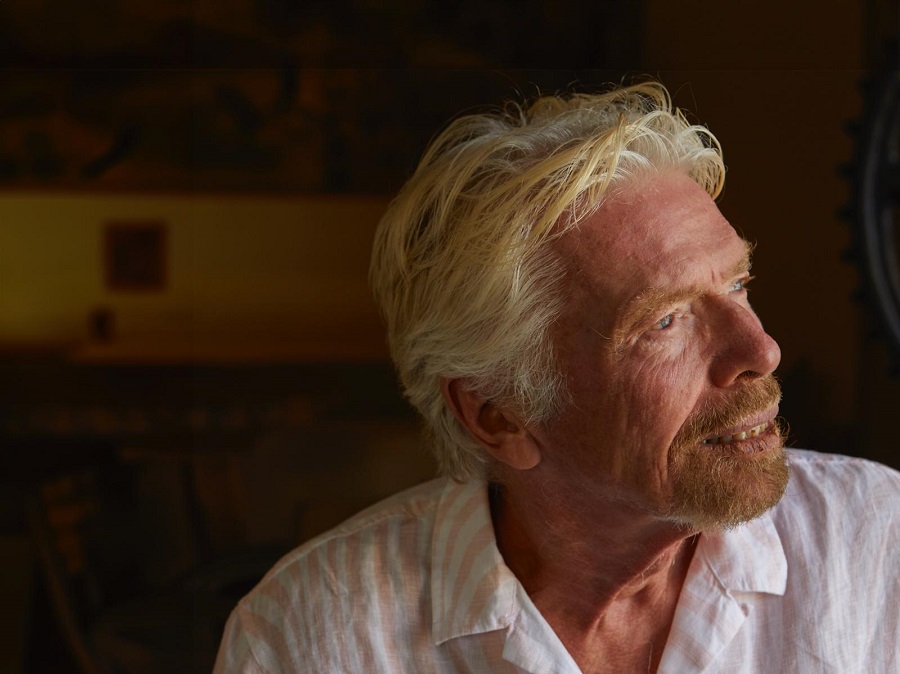
Richard Branson. Photo: Paloma Rodriguez Barceló
In your book, you mention that charitable donations are important, but that making an investment capable of generating profit is more sustainable. In other words, altruism with return. Could you elaborate on this idea?
We created an organization called Audacious Ideas, in partnership with Chris from TED. We identify the six most urgent global problems that require charitable money to solve. Then we bring the world’s wealthiest people to Necker Island for four days and raise, say, a billion dollars. That’s purely charitable money.
Then we created another organization with Bono called The Rise Fund, which is the for-profit version. We’ve raised several billion to invest in organizations that can change the world and address major problems. And because investors get a return, we can attract more and more capital. They’re self-sustaining.
It took nearly 20 years for your dream of space travel to become reality—something you had imagined since childhood. What are the next steps for your space company?
The spacecraft I flew to space in was a prototype, a test flight. It has flown to space twelve times. But between each flight, we had to wait about two months to thoroughly inspect everything, because it was still a prototype. Since my flight, the entire team has been focused on building new spaceships and motherships that work more like airplanes. So they don’t have to be taken apart for months—they can be ready in 48 hours.
We’re just a few months away from launching the first of those new vehicles—the next prototype. If everything works, then we’ll be able to allow many more people to go to space. We’re certainly not lacking people who want to go.
What meaning do you give to life at this stage?
For me there's two lives, so you've got your children and your grandchildren, and your wife and your friends. That's an extremely important part of one's life. And then, I don't want to waste my life, so I've found myself in quite a unique position. So I want to try to make a positive difference in as many ways as I can. On my last day on Earth, I’ll feel at peace if I’ve kept my reputation intact, passed on values to my children and grandchildren, and left the world a little better than I found it.
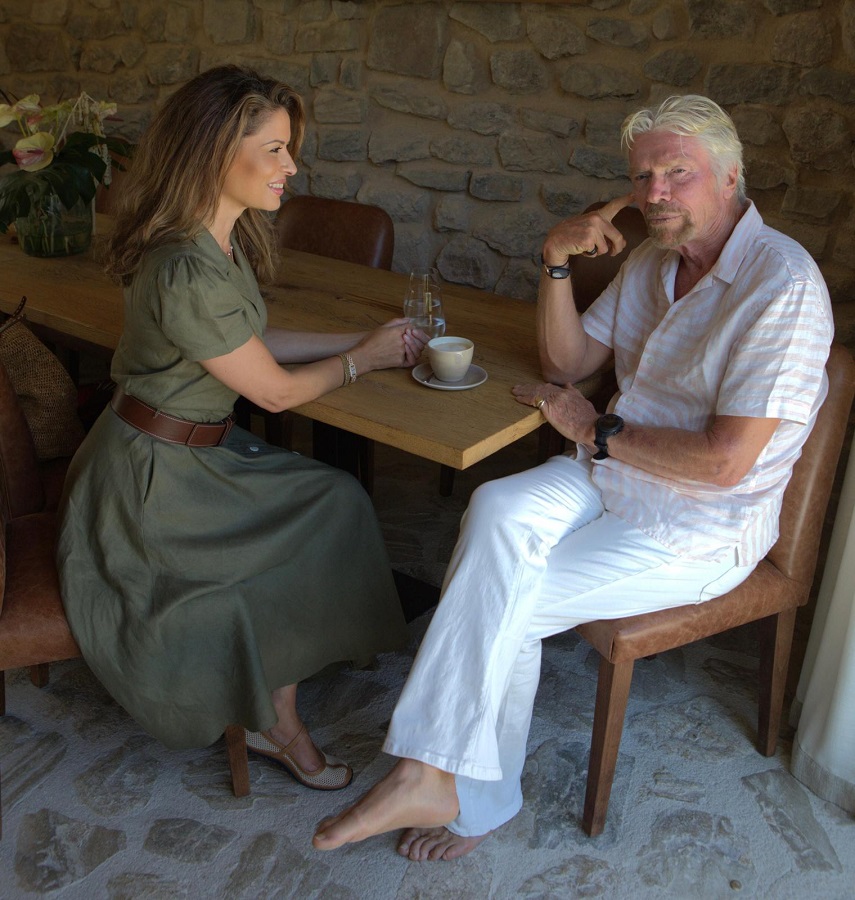
Richard Bradson and Elena Cué. Son Bunyola. Photo: Paloma Rodriguez Barceló
- Interview with Richard Branson - - Alejandra de Argos -

